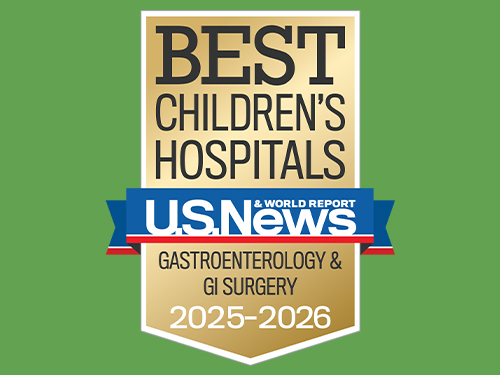Conditions We Treat
Gastroschisis
A congenital (present at birth) condition where the newborn baby’s intestines, and possibly other organs including the stomach and liver, are located on the outside of the body. The intestines move outside the body through a hole that develops in the fetal abdominal wall. The severity depends on how much of the intestines (and/or organs) have moved through this hole. Affected intestinal tissue may become twisted, blocked or separated, leaving only a short segment of the bowel that functions normally.
Learn more
Intestinal Atresia or Stenosis
Intestinal atresia is a complete blockage in the small intestine; intestinal stenosis is a narrowing of a portion of the small intestine. Both conditions create an abnormal opening that develops because a portion of the intestinal tract did not completely form before birth. Intestinal atresia or stenosis most frequently occurs in the lower part of the small intestine (ileum). It can also occur in other areas, including the part of the intestine that empties from the stomach (duodenum), the part of the intestine that extends from the duodenum to the ileum (jejunum), or the large intestine (colon). Infants with this condition fail to pass stools and may vomit.
Learn more
Necrotizing Enterocolitis (NEC)
NEC is a serious condition where the intestinal tissue becomes inflamed and dies. It most often affects premature babies, and develops in the first several weeks after birth.
Learn more
Volvulus (including Malrotation with Midgut Volvulus and Segmental Volvulus)
Volvulus is a condition that results from intestinal malrotation. During a normal pregnancy, the fetus’ intestines move, rotate and eventually become fixed as they develop. With intestinal malrotation, this process does not occur properly. The failure to move and rotate into the correct location causes twisting and an intestinal blockage that causes problems with digestion.
Learn more
Intestinal Aganglionosis (Hirschsprung Disease)
Hirschsprung disease is a rare, congenital (present at birth) abnormality where an obstruction forms in the large intestine that causes problems passing stool. The condition occurs when there is a section of intestinal tissue that does not have nerve cells. Without these nerve cells, the large intestine does not function properly to move matter through the colon, and a blockage develops. Hirschsprung disease occurs more frequently in males than females, and is commonly found in children with Down syndrome.
Learn more
Tufting Enteropathy
This rare, genetic disease occurs when the cells of the intestinal lining do not develop normally and are unable to absorb nutrients. Severe diarrhea results and children require intravenous (IV) nutrition to avoid dehydration and to grow properly. Tufting enteropathy usually develops soon after birth, and is one of several conditions known as congenital diarrheas.
Microvillus Inclusion Disease (MVID)
Microvillus inclusion disease is a rare, genetic disorder that occurs when the cells of the intestinal lining do not develop normally and are unable to absorb nutrients. MVID is one of several types of congenital diarrheas. Similar to tufting enteropathy, patients with MVID will need intravenous (IV) nutrition for proper growth and to avoid dehydration.
Meconium Ileus or Peritonitis
Meconium ileus is an obstruction or blockage of the intestine that occurs when the meconium (baby’s first stool) is thicker and stickier than normal meconium. This blockage usually occurs in the lower portion of the small intestine (ileum), and is common among patients with cystic fibrosis.
The severity of meconium ileus varies. Simple meconium ileus can be treated with an enema to clear out the thick meconium. Sometimes surgery is needed to eliminate this type of blockage. More severe cases, known as complicated meconium ileus, occur when the meconium blockage damages or perforates the intestines. These more severe cases require surgical intervention.
Omphalocele
An omphalocele is a congenital (present at birth) condition where the intestines or other abdominal organs develop outside the abdomen in a transparent sac at the base of the umbilical cord. It is normal for the organs to develop outside of the abdomen up until the tenth week of pregnancy, but if they do not return to the abdomen following that period, an omphalocele may develop. In many cases, infants born with an omphalocele also have other health problems, including heart defects, chromosomal abnormalities, fetal growth abnormalities and preterm delivery.
Learn more
Chronic Intestinal Pseudo-Obstruction (CIPO)
CIPO is a rare, severe gastrointestinal motility disorder. It may involve one or more areas of the gastrointestinal tract, including the esophagus, stomach, small intestine and large intestine (colon). Sometimes the bladder or rectum may be affected.
With normal gastrointestinal function, the muscles contract to push food from the mouth to the anus. This process is called peristalsis, and normal peristalsis is important for digestion. Children with CIPO experience ineffective peristalsis, usually caused by damaged gastrointestinal muscles or nerves, and their digestion is impaired. The intestines react as through there is an obstruction or blockage, but actually there is no physical evidence of such a blockage. This is why the condition is labeled “pseudo-obstruction.”
The cause of CIPO is often unknown, but several genetic causes have been identified. CIPO can be either congenital (present at birth) or acquired (developed after birth). Acquired CIPO is managed by treating the underlying cause. There is no cure for congenital CIPO, and the goals of treatment are to manage symptoms, minimize pain and provide nutritional support.
Megacystis Microcolon Intestinal Hypoperistalsis syndrome (MMIHS)
MMIHS is a rare, genetic disorder that affects the muscles of the bladder and intestines. With this condition, the muscles are unable to contract and move properly, and sometimes they do not move at all. Children with MMIHS have an enlarged bladder and a small colon.
This disorder causes difficulty passing urine and completely emptying the bladder, and an inability to digest food normally. Some children may need a catheter (thin tube) to help remove the urine, and may need assistance with a feeding tube or intravenous (IV) nutrition. There is currently no cure for MMIHS, and treatment is aimed at improving urination and digestion.
Intestinal Failure-Associated Liver Disease (IFALD), Parenteral Nutrition-Induced Liver Disease (PNALD) or Cholestasis
IFALD, PNALD or cholestasis occur when patients develop liver dysfunction while receiving intravenous (IV) nutrition. IFALD can lead to cirrhosis and liver failure, and some children will need a liver transplant. Treatment strategies involve changes in IV nutrition, including decreasing the amount of inflammatory nutritional elements and using newer types of IV lipid emulsions. These conditions are also treated by reducing infections or septic events, including bloodstream infections.





